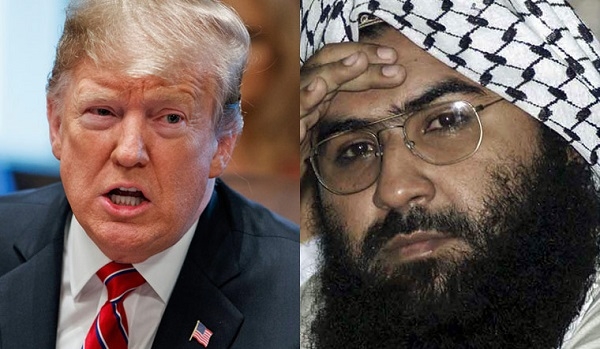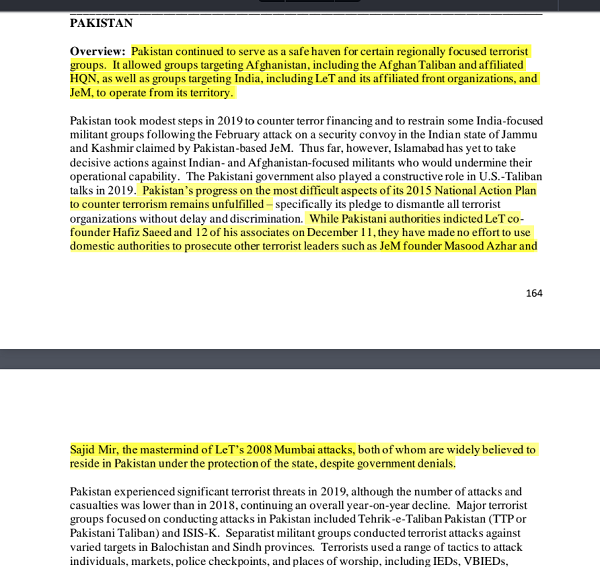'Pakistan Remains Safe Haven For Terrorists Groups Targeting India' says US State Dept
Total Views |
Washinton DC, June 25: "Pakistan has continued to serve a safe haven to terrorist groups targeting India and allowed them to operate from its territory and, their government allows outfits including the Lashkar-e-Tayyiba and Jaish-e-Mohammed to operate from its territory," the US State Department of State Bureau of Counterterrorism slammed Pakistan in his a new report released on Wednesday.

The state department claimed that Pakistan also allowed groups targeting Afghanistan, including the Afghan Taliban and affiliated HQN, as well as groups targeting India, including LeT and its affiliated front organizations, and JeM, to operate from its territory.
The 2019 Country Reports on Terrorism provide a detailed review of U.S. and partner efforts to defeat and degrade terrorist organizations. We remain deeply committed to the global fight against terrorism. Read the full report: https://t.co/L4HpzHweSF
— Secretary Pompeo (@SecPompeo) June 24, 2020
The Department also overviewed Pakistan’s progress on the most difficult aspects of their 2015 National Action Plan to counter-terrorism. On the other hand, the US asserted that Pakistan’s progress on this aspect "remains unfulfilled"- specifically its pledge to dismantle all terrorist organizations without delay and discrimination.
The report further stated that Pakistan has made no effort to use domestic authorities to prosecute terrorist leaders such as Jaish-e-Mohammad (JeM) founder Masood Azhar and the mastermind of 2008 Mumbai attacks Sajid Mir. "Pakistani authorities indicted LeT co-founder Hafiz Saeed and 12 of his associates on December 11, they have made no effort to use domestic authorities to prosecute other terrorist leaders such as JeM founder Masood Azhar and Sajid Mir, the mastermind of LeT’s 2008 Mumbai attacks, both of whom are widely believed to reside in Pakistan under the protection of the state, despite government denials," report said.
Further, it added that Pakistan experienced significant terrorist threats in 2019, although the number of attacks and casualties were lower than in 2018, continuing an overall year-on-year decline. Major terrorist groups focused on conducting attacks in Pakistan included Tehrik-e-Taliban Pakistan (TTP or Pakistani Taliban) and ISIS-K.
Reporting on how these terrorist groups target India, it stated, "In 2019, India suffered terrorist attacks in the state of Jammu and Kashmir, the northeastern Indian states, and parts of central India. The Government of India continued to apply sustained pressure to detect, disrupt, and degrade terrorist activities within its borders. Prime Minister Modi and other senior Indian leaders made numerous statements to condemn domestic terrorist attacks and bring to justice the perpetrators of terrorism, in cooperation with the United States and other like-minded countries." it said. (Page no 165, 150)
The report highlighting on Indian security agencies, it stated that those agencies are effective in disrupting terror threats despite some gaps in intelligence and information sharing. In 2016, India and the United States signed an arrangement to exchange terrorism screening information, and India continues to work on implementation.
Both countries announced their intent to prevent terrorists from obtaining access to weapons of mass destruction and underscored their respective commitments to the implementation of UNSCR 2396. In December, the United States hosted the 2+2 Ministerial Dialogue, in which the ministers called for concerted action against all terrorist networks, including AQ, ISIS/Daesh, LeT, JeM, HQN, Hizb-ul Mujahideen, and TTP.
Besides that the global terror financing watchdog, Financial Action Task Force (FATF), on Wednesday decided to keep Pakistan in the "Grey List" as Pakistan has failed to check to terror funding to terror groups like the LeT and the JeM, officials said. FATF plenary which decided continuation of Pak in 'Grey List' was chaired by its president Xiangmin Liu of China. "The decision has been taken as Pakistan has failed to check the flow of money to terror groups like Lashkar-e-Taiba (LeT) and Jaish-e-Mohammed (JeM)," the official said.

In January 2018, the U.S. government suspended most of its security assistance to Pakistan over the government’s failure to adequately address the threat posed by militant and terrorist groups operating on Pakistani soil. That suspension remained in effect throughout 2019.
In June 2018, the FATF placed Pakistan on its “gray list” and issued an Action Plan directing Pakistan to take specific steps by September 2019 to address strategic deficiencies in its CFT efforts. The FATF expressed serious concern at its October 2019 plenary about Pakistan’s continued deficiencies but noted it had made some progress and extended the deadline for full Action Plan implementation to February 2020. In 2018, Pakistan was designated as a “Country of Particular Concern” (CPC) under the International Religious Freedom Act of 1998. It was re-designated as a CPC in 2019.

